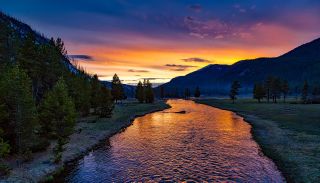The first national park in U.S. history was Yellowstone, designated in 1872 as “a public park or pleasuring-ground for the benefit and enjoyment of the people.” Since then, 424 additional sites have been added to the National Park System, which now encompasses all 50 states and provides more than 85 million acres of natural, historical, and cultural learning opportunities.
Expeditions in Education channels those vast resources into real-world STEM learning. The nonprofit was founded by former longtime STEM educator Dacia Jones and her husband Steve, who now travel around the country 260 days per year, filming in the national parks. At each stop, they talk to rangers, research the challenges that site faces, and then create content that includes a look at each park, its history, its place in the world, and a STEM challenge.
“On our website we have more than 140 videos filmed at national parks that are tied to the UN Global Goals,” says Dacia Jones. “Educators can choose any of these parks and connect them to what they are currently doing in the classroom. For example: If they are talking about weathering and erosion, they may choose to virtually visit Bryce Canyon. All of these are completely free and available for anyone.”
Love the World, Save the World
Growing up, the allure of national parks was instilled in the couple, whose separate families made regular pilgrimages to various sites to camp, hike, picnic, and explore. “As our paths intertwined when we got married, we sought to continue this legacy, introducing our children to the enchanting realm of the Great Smoky Mountains,” says Jones.
As an educator, Jones realized that these places are a “natural” fit for STEM learning. “National parks are living, breathing repositories of knowledge,” she says. “They present unparalleled opportunities for genuine exploration. Students and educators are not just reading about ecosystems, but witnessing them in real-time.”
Through Expeditions in Education, students and teachers also get to tap into expert, first-hand knowledge by interacting directly with those on the ground at the sites.
“The nice thing is that we connect with all the rangers and the education departments of the national parks,” says Rodney Crouse, a fifth-grade teacher for Guilford County Schools in North Carolina and avid program participant. “So throughout the year, if we're working on ecosystems or particular historical stuff, the rangers will do Zooms with our class and answer questions, and it's one-on-one with experts.”
“It's truly magical to see students recognize a part of themselves in the passionate faces of these rangers,” says Jones. “This approach also fosters a deeper connection and respect for one another and the planet, laying the foundation for raising the next generation of empathetic, environmentally conscious, and responsible citizens.”
Crouse recommends getting students involved in nature journaling, using John Muir Laws as a “how to” example. He says, “The big thing is that we want kids to save the world, but unless you teach them to love it and let them fall in love with it first, they're not going to care about it.”
Live! From . . .
Expeditions in Education regularly hosts Crossing America LIVE events in schools during which students learn more about national parks. Crossing America LiveStreams are also regularly presented.
“Last year, we had more than 13,000 join us virtually as we live streamed from the ice lakes in Voyageurs National Park in February (-8 degrees on the ice lake!),” says Jones. “In April, we had over 15,000 students from around the country tune in as we talked with Ranger Jody on the rim of Kilauea in Hawai'i Volcanoes National Park.”
For the Crossing America events, Crouse suggests downloading the companion document so that students can record locations and information they learn from the experience. “When joining live events, be awkward! Ask questions! Participate!” he says. “Follow up and follow through. Have students meet the challenges posed by Dr. Drizzle and the Sustainable Goals along with the National Parks.”
In the upcoming school year, five LiveStream events are scheduled, including:
- October 31: A visit to the swamps of Big Cypress National Park in Florida to meet with Ranger Lisa and dispel myths about swamp water.
- November 9: Broadcasting live from the tidepools at Acadia National Park in Maine where attendees will meet the invasive European Green Crab.
- December 7: A trip to Jimmy Carter's boyhood home at the Jimmy Carter National Historical Park in Georgia.
All of these virtual events are free. Register at expeditionsineducation.org/4thgrade.html.
Don’t Forget the S’mores!
In addition to the in-school and virtual learning opportunities, teachers can participate in STEAM in the Park, a paid educators-only summer camp experience that runs from June through the middle of August. This past year, more than 400 educators from across the country converged on 12 national parks for hands-on learning opportunities.
Crouse recently attended a STEAM in the Park trip to Voyageurs National Park in northern Minnesota. “We met with the Voyageurs Wolf Conservancy project team, and the guy came out and he showed us the collars and all the things that they do,” he says. “He showed us his crazy wolf howl, and then the wolf pups would respond back.”
Ultimately, national parks offer seemingly endless opportunities for learning.
“Our advice to prospective participating educators is straightforward: Take the plunge!” says Jones. “It’s crucial to foster an environment where students feel empowered to drive the instruction and educators act as facilitators.”
“Jump in with both feet -- sometimes literally,” adds Crouse. “And let the beauty of nature and the wonder of curiosity lead you and your students on a new adventure!”

